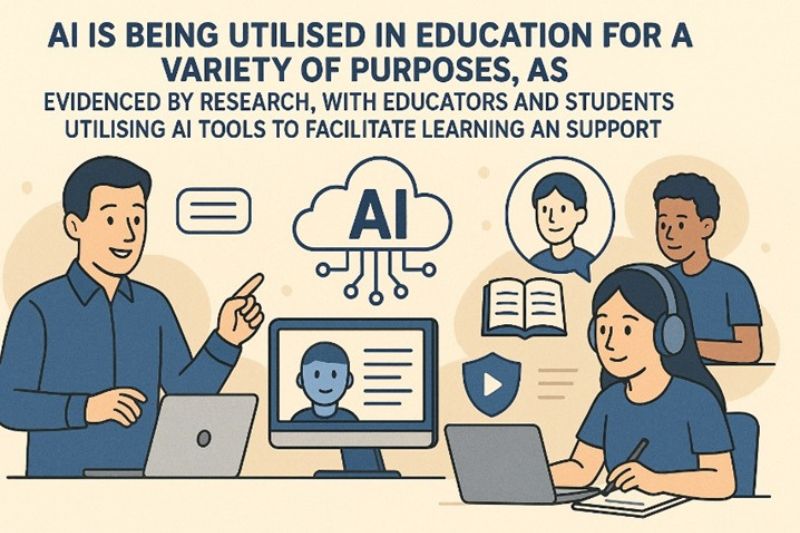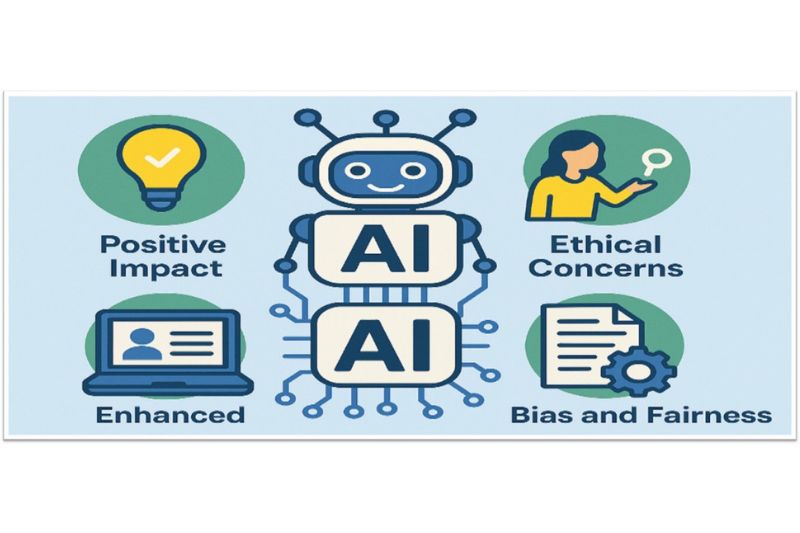AI, which stands for Artificial Intelligence, is a part of computer science that deals with creating smart machines to do tasks that typically need human intelligence. Artificial intelligence involves making algorithms and models that help machines to sense, understand, analyze, learn, and make decisions that can be like or even surpass human abilities. The progress of IR 4.0 has far-reaching consequences for industrialized nations like the US, EU, and Japan. They have implemented the advantages of artificial intelligence, robotics, and Big Data in their economic, political, and social endeavors. Believing 's transformative potential, the Malaysian government has taken aggressive steps to integrate it into the educational system. Malaysia's readiness for artificial intelligence adoption is evident through the increase and indicates the progressive execution of AI-related efforts. The Malaysian government has proactively initiated the integration of artificial intelligence into the education system and one of the main points of the Malaysia Education Blueprint 2013–2025 is the significance of using technology to improve educational results.
Worldwide, parents are increasingly interested in AI-focused education for their children, viewing it as essential to current learning rather than a supplementary tool, thanks to the expanding digital economy. Dr. Kavita Sharma, an educational technology expert at the University of Melbourne states parent is no longer solely focused on test scores. She has described parents in this era want their children not merely exist in it but to know that systems are interconnected, and that they can make a difference in the world using technology. Parent of Gen Alpha and Gen-Z students are increasingly interested in artificial intelligence not merely as a technology but as a subject of study in schools.

Educational institutions primarily higher institutions began implementing artificial intelligence curriculum aimed at imparting fundamental artificial intelligence principles in a manner suitable for various age groups. In certain countries artificial intelligence schools are changing education, an AI-driven virtual school have been launched and offering adaptive learning with a small team of human provides support when needed. The pressing question now is whether educators are truly prepared to embrace the full integration of artificial intelligence in the education sector. Are they ready to shift from traditional methods to AI-enhanced teaching models? More importantly, what are their views on embedding artificial intelligence into the academic syllabus not just as a tool, but as a fundamental component of the learning process? Do they see artificial intelligence as a valuable partner in pedagogy, or as a disruptive force that challenges the core of human-led instruction? Traditional education has always relied on the teacher as the ultimate source of knowledge. But with artificial intelligence now offering custom lesson plans, predictive analytics, and even conversational tutoring, the classroom is transforming from a static lecture space to an intelligent, interactive ecosystem.
Educators frequently voiced worry about student over-reliance specifically if artificial intelligence turn students too passive or too dependent on tools for answers instead of participating in critical thinking. Even if artificial intelligence increases access and accelerates learning, it could compromise depth of knowledge. Educators are not merely imparting facts they are nurturing critical thinking skills. If artificial intelligence is allowed to handle all aspects of thinking, it raises a fundamental concern of the role left for the student in developing their own reasoning. Another issue is plagiarism. Educators are concerned about finding unoriginal work as artificial intelligence writing tools get more complex. Educators rely on plagiarism software like Turnitin, but even these tools struggle with AI-generated paraphrasing such as Quillbot and Writehuman. Despite existing challenges, educators are showing a strong willingness to adopt artificial intelligence particularly when the tools are intuitive and accompanied by adequate training. Notably, the teaching background plays a significant role in shaping perceptions among educators. Educators from technology-oriented faculties, such as Information and Communication Technology, demonstrate greater ease and readiness in integrating artificial intelligence tools into their teaching. In contrast, educators from non-technical disciplines might need for more structured guidelines and institutional support to build confidence and competence in using artificial intelligence effectively. The primary barrier is not resistance, but a lack of familiarity.
Educators will undoubtedly find it easier to adapt to artificial intelligence and confidence grows when proper training and support are in place. Students are already adopting artificial intelligence often faster than their educators. Whether it’s for writing essays, researching topics, or understanding complex theories, learners are tapping into artificial intelligence as a digital tutor. It’s like giving them a calculator before they know how to add, where it is useful, but risky if misused. Educators may observe mixed results. Some students demonstrated improved engagement while others display signs of over-dependence.To address this, educators and policymakers must ensure that artificial intelligence education remains ethical, inclusive, and balanced. With opportunity comes responsibility, hence guidance on artificial intelligence usage to help students use these tools as support systems rather than shortcuts is vital. The rise of artificial intelligence in education is not a question of if, but how.
The enthusiasm among educators is real but so are the concerns. Government, Education Institutions, policymakers must now offer training, ethical frameworks, and ongoing support. The classroom of tomorrow won’t eliminate the educators, it will elevate them. Imagine an educator who uses artificial intelligence to personalize instruction, spot struggling students early, and free up time for mentoring and creative engagement. Artificial intelligence won’t replace human wisdom, but it will amplify it.
Writer’s profile
Associate Prof. Dr. Sabariah binti Yaakub at Othman Yeop Abdullah Graduate School of Business, Universiti Utara Malaysia.
Ms Aruna Raj Devarajoo, currently pursuing Doctor of Business Administration at University Utara Malaysia (UUM).


